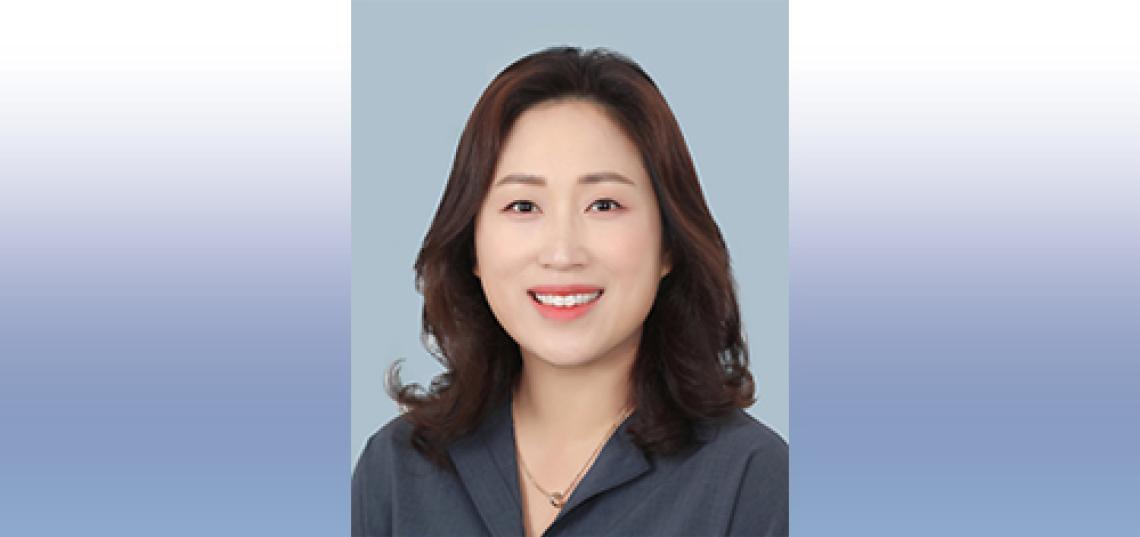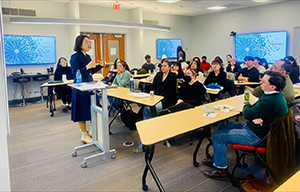
In early February 2024, Sun Kyong Lee Ph.D.’13, an associate professor at the School of Media and Communication at Korea University in Seoul, Korea, visited SC&I with some of her students. She presented a talk titled “Can We Trust Machines? Insights from a Series of Experiments in Human-Machine Communication,” and her students presented their work in Assistant Professor DaJung (DJ) Woo’s class.
In addition to visiting Rutgers on their field trip to the U.S., Lee took her students to visit many other exciting destinations. On LinkedIn, Lee wrote, “Led another successful field trip for my students from Korea University. Visited MIT media labs, Boston U, Harvard, Emerson college, Microsoft, Google, Meta, NYIT, NYT and UN headquarters in NYC!! Met with so many inspiring people and learned so much from them all. Also gave a talk at my alma mater, Rutgers and had my students present in Dr. Woo’s class. Felt so rewarded when all my students told me they had amazing experiences and lifelong lessons from this trip!”
While a doctoral student at SC&I, Lee won an Award for Distinguished Achievement as a Teaching Assistant from the Communication Department. She was also awarded a Faculty Resource Development Grant from Continuing Education at Rutgers University for developing a hybrid class of summer session course on Introduction to Communication and Information Processes. She was also involved in the Doctoral Student Association as the second vice president.
Lee’s doctoral dissertation was titled “A study of the impact of organizational communication networks and personal communication technology uses on Korean immigrants’ intercultural development” and her faculty advisor for her dissertation was James E. Katz (now a faculty member at Boston University). Her committee members were Craig R. Scott (now at the University of Texas at Austin) and Jennifer Gibbs (now at the University of California, Santa Barbara), and she had an outside committee member as well, George Barnett (University of California, Davis [retired]).
After she graduated from SC&I, Lee spent eight years as a faculty member at the University of Oklahoma, six years as an Assistant Professor and two years as an Associate Professor.
Lee spoke with SC&I about her research and teaching, her experience as a Ph.D. student at SC&I, and her collegial relationship with SC&I Associate Professor of Communication Matthew Weber.
 SC&I: How did you become interested in your field?
SC&I: How did you become interested in your field?
SKL: My area of expertise can be characterized as communication and technology studies, or mediated communication research. Additionally, I align myself with the field of organizational communication networks. My interest in the communication and technology field blossomed during my first master’s program in Korea. There, I delved into a thesis examining generational and lifestyle differences in mobile phone usage within Korean society.
In 2002, South Korea underwent significant political shifts with the election of a new president, a movement largely supported by younger generations. This pivotal moment sparked discussions among academics and journalists about generational changes in politics and society. Intrigued by these discourses and the sociological theories surrounding generational dynamics and societal transformation, I explored how different generational and lifestyle groups in Korea utilized mobile phones distinctively. My research was founded on the premise that media plays a vital role in shaping shared cultures and consciousness within a generation cohort.
Through my study, I discovered distinct motivations and usage patterns among the three generational groups analyzed. Furthermore, it became evident that lifestyle similarities were more pronounced within generational groups rather than across them. This initial exploration ignited my ongoing fascination with mobile phone phenomena.
Subsequent research endeavors led me to investigate diverse topics, such as comparing mobile phone usage between US and Korean college students (explored in my second master’s thesis), observing the effects when a group of college students was deprived of phone access during a weekend trip to a suburban YMCA camp, and collaborating with German scholars to test a comprehensive model of mobile phone appropriation.
The allure of studying mobile communication propelled me to pursue a Ph.D. at Rutgers University, driven mainly by the pioneering work of Dr. James Katz, who was a faculty member and chair of the communication department at that time.
"One aspect of my experience at Rutgers that I particularly appreciated was the opportunity to take basic courses (601, 602) alongside students from neighboring majors. This exposure broadened our horizons and provided access to a diverse array of foundational literature in the field."
SC&I: What are some of the most important ways the Ph.D. program at Rutgers School of Communication and Information benefitted you and contributed to your professional success?
SKL: During my six years at Rutgers for my Ph.D. program, I acquired a wealth of invaluable theoretical knowledge and methodological skills that continue to enrich my research endeavors to this day. I am deeply grateful for the comprehensive education I received, which has left a lasting impact on my academic journey.
One aspect of my experience at Rutgers that I particularly appreciated was the opportunity to take basic courses (601, 602) alongside students from neighboring majors. This exposure broadened our horizons and provided access to a diverse array of foundational literature in the field. Reflecting on my career, I've come to recognize the significance of transdisciplinary and interdisciplinary approaches in research and grant applications, and I credit Rutgers for instilling this awareness in me early on.
Financial support was also instrumental throughout my program. For the first three years, I was funded through a teaching assistantship, and for the subsequent three years, I received support from the DCIM program (where I had the distinction of being the first full-time instructor hired to teach Org Comm Dynamics Online). This generous assistance alleviated financial burdens, allowing me to focus wholeheartedly on my studies.
Additionally, Rutgers afforded me numerous opportunities to teach undergraduate courses across various subject areas. By the time I graduated, I had amassed ample evidence of my teaching effectiveness—a crucial asset for an international student like myself seeking employment in the United States. I am profoundly grateful for the exceptional education and financial support I received from Rutgers. Without their unwavering support, I would not have been able to realize my aspirations and accomplishments. Rutgers has played an integral role in shaping the scholar and educator I am today, and for that, I am truly thankful.
SC&I: Did any professors and classes have a significant impact on you while you were a Ph.D. student? Do they continue to influence you currently as a faculty member and mentor?
SKL: Absolutely! During my time at Rutgers, I had the privilege of being advised by Dr. James Katz, with Craig Scott and Jennifer Gibbs serving as core committee members. I had the opportunity to take classes from each of them and collaborate on research projects throughout my PhD program. Dr. Katz, who had been directing the Emerging Media Studies division at Boston University until recent, has been an exceptional supporter and mentor to me both during my studies and beyond. His respect for my aspirations and critical guidance have been invaluable. Not only did he impart essential academic ethics and etiquette, but his generosity and kindness toward everyone have also been a constant source of inspiration. I maintain regular communication with him and continue to collaborate on research projects, drawing from his wealth of knowledge and experience.
My first publication during my program was a collaborative effort with Craig and Jennifer, alongside another cohort member. Together, we transformed a class paper into a book chapter—an experience that provided invaluable insights into the publishing process. Craig and Jennifer's patience and constructive feedback were instrumental in bolstering my confidence and resilience as a budding scholar. Even today, I seek their counsel on research and teaching matters, as they continue to serve as exemplary role models and offer invaluable feedback.
In my final year of the doctoral program, Rutgers hired Matt Weber, whose impact on my academic journey cannot be overstated. From attending his job talk to nudging him to join Rutgers, I was so impressed by Matt's expertise and his support have been so instrumental for my own dissertation research and job preparation. As I delved into social network analysis for my dissertation research, Matt graciously helped whenever I reached out to him. Even after I transitioned to my first faculty position at the University of Oklahoma, Matt remained a steadfast mentor, offering guidance on data analysis and manuscript preparation through online meetings. For my own job talk practice, Matt attended in person and provided me with valuable feedback. I even copied his job talk slide format since it looked so great! Our collaboration extended to an NSF grant application, culminating in a successful grant for my former colleagues at OU with Matt—a testament to the value of our connection and my role as a liaison in that process. I am immensely grateful for Matt's mentorship and continued support, and I look forward to our ongoing interactions at conferences and potential collaboration in the future.
"This fall, I will have my first sabbatical from Korea University, during which I plan to focus on studying Hispanic immigrant networks."
SC&I: Are you working on any current research projects that relate to your doctoral dissertation?
SKL: Certainly! My dissertation focused on examining a Korean immigrant church community in New Jersey, specifically exploring the associations between their organizational communication networks, personal communication technology usage, and intercultural development. As I progressed with my dissertation research, I expanded my interest group to include Muslim immigrants and initiated data collection in this community as well. Although the publication process for this research has presented challenges following its presentation at the National Communication Association (NCA), my team and I remain committed to our efforts.
Moreover, a graduate student at the University of Oklahoma expressed interest in applying a similar research design to study Vietnamese Buddhist communities. We collaborated on data collection for this project, and we are currently in the process of preparing our first paper for publication while also working on analyzing a second dataset.
This fall, I will have my first sabbatical from Korea University, during which I plan to focus on studying Hispanic immigrant networks. Despite facing setbacks in securing research grants for data collection, I am determined to initiate this research endeavor. This time, the research will explore Hispanic immigrants' social networks and their connections to disaster preparedness, civic engagement, and political participation. I am eager to delve into this new area of study and contribute to our understanding of various religious and ethnic immigrant communities and their experiences in the host societies.
Learn more about the Ph.D. Program at the Rutgers School of Communication and Information on the website.
Photo: Lee lecturing at SC&I. Credit: Melissa Aronczyk
